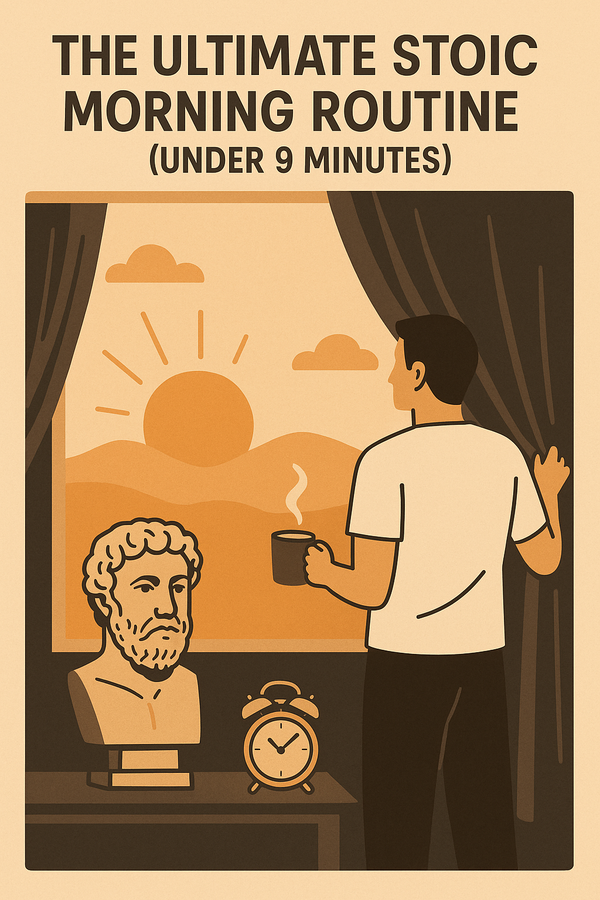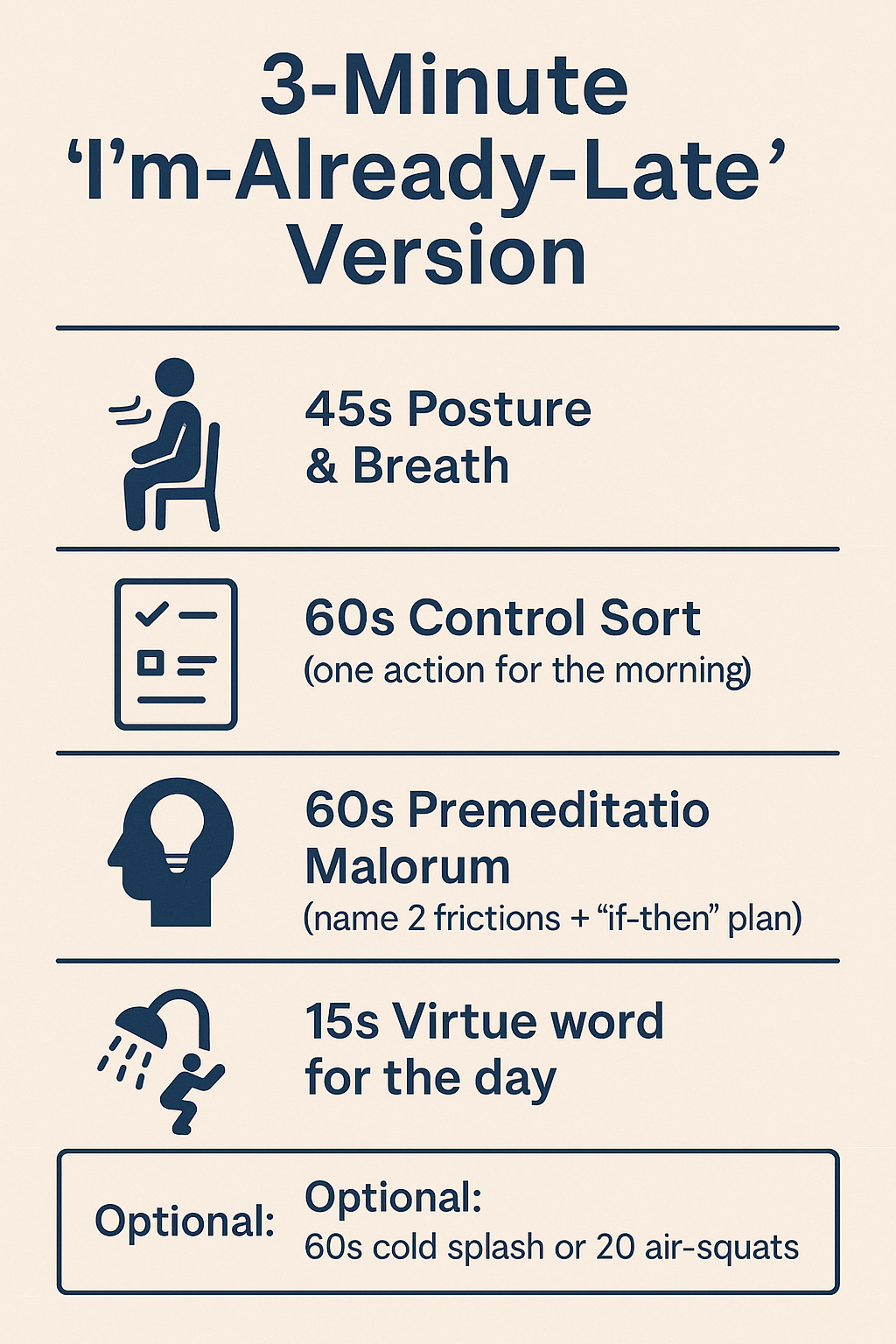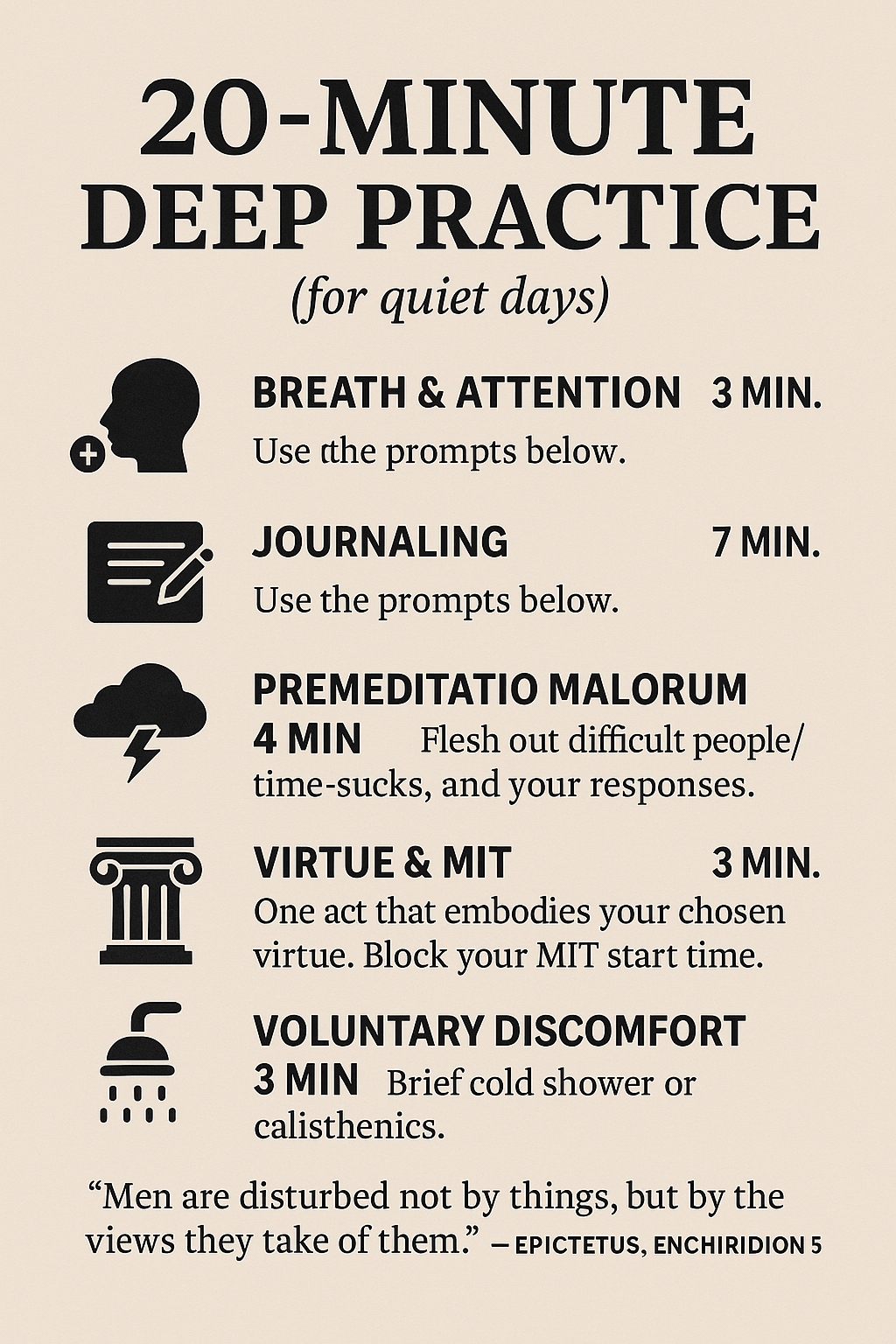
The Ultimate Stoic Morning Routine (Under 9 Minutes)
A time‑boxed Stoic morning routine (3, 9, and 20‑minute versions) with scripts from Marcus, Epictetus & Seneca—plus prompts, checklists, and FAQs.
Stoicism is a practice, not just a set of ideas. Here, you'll learn a daily 9-minute Stoic ritual that will making losing the day impossible.
The logic is simple: start your day focused on virtue and what's in your control, chaos will be contained and obstacles become power-ups.
“At dawn, when you have trouble getting out of bed, tell yourself: I’m rising to do the work of a human being.”
— Marcus Aurelius, Meditations 5.1
Table of Contents
- Why a “Stoic Morning” Works
- The 9‑Minute Stoic Morning (Minute‑by‑Minute)
- 3‑Minute “I’m‑Already‑Late” Version
- 20‑Minute Deep Practice (for quiet days)
- Prompts, Scripts & One‑Card Checklist
- FAQ (People Also Ask)
- Sources & Further Reading

Why a “Stoic Morning” Works
The Stoics didn’t waste their mornings. They rehearsed the day (premeditatio malorum), chose a worthy posture toward events, and acted on first principles: wisdom, courage, justice, temperance.
Three principles they would have kept in mind:
- Dichotomy of Control. Decide what you control (judgments, intentions, actions) vs. what you don’t (weather, other people, outcomes). See Epictetus, Enchiridion 1.
- Not by things, but by opinions. Your judgments drive your emotions; fine‑tune judgments, and you change your day. See Enchiridion 5 / Wikisource.
- Premeditatio Malorum. Briefly anticipate friction: people, delays, tech gremlins. You harden peace in advance. See Seneca’s articulation here.
The 9‑Minute Stoic Morning (Minute‑by‑Minute)
0:00–1:00 — Posture & Breath (1 min)
Sit or stand tall. Breathe slowly through the nose. On each exhale, silently say: “I control opinions, intentions, actions.” That’s your anchor.
1:00–3:00 — Premeditatio Malorum (2 mins)
Answer two questions in your notes app or notebook:
- What 3 obstacles are likely today? (name them plainly)
- What will I do when each appears? (one sentence “if‑then”)
If you want a script: read Marcus’s morning reminder about difficult people from Meditations 2.1 (Hays trans.).
3:00–5:00 — Control Sort & Commitments (2 mins)
Draw two quick columns: Control / No Control. Move today’s anxieties into the right column. For each item in Control, write one behavior you’ll do in the next 3 hours.
5:00–7:00 — Virtue Cue + MIT (2 mins)
Pick one cardinal virtue you want to embody today: Wisdom, Courage, Justice, Temperance. Write one sentence:
- “Today I practice Justice by (specific act).”
Then choose your MIT (Most Important Task) for the day and schedule its start time.
7:00–8:00 — Voluntary Discomfort (1 min)
Cold rinse, 30 air‑squats, or 60 seconds of wall‑sit. Keep it safe and tiny. The point is askēsis (training). Seneca recommends practicing poverty/privation at times—start micro in the morning: Letter 18.
8:00–9:00 — View From Above or Gratitude (1 min)
Close eyes: zoom out from your desk → building → city → earth. Let scale shrink petty irritations. Or list 3 things you’ll be grateful still to have tonight. Try this primer on the practice: View From Above.
Done. Now open your calendar, not your inbox.
3‑Minute “I’m‑Already‑Late” Version
- 45s Posture & Breath.
- 60s Control Sort (one action for the morning).
- 60s Premeditatio Malorum (name 2 frictions + “if‑then” plan).
- 15s Virtue word for the day.
Optional: 60s cold splash or 20 air‑squats.

20‑Minute Deep Practice (for quiet days)
- Breath & Attention (3 min).
- Journaling (7 min). Use the prompts below.
- Premeditatio Malorum (4 min). Flesh out difficult people/time‑sucks, and your responses.
- Virtue & MIT (3 min). One act that embodies your chosen virtue. Block your MIT start time.
- Voluntary Discomfort (3 min). Brief cold shower or calisthenics.
“Men are disturbed not by things, but by the views they take of them.”
— Epictetus, Enchiridion 5 (translation lineup)

Prompts, Scripts & One‑Card Checklist
Prompts (copy/paste):
- Control: What’s bugging me? Which part is mine to control? What behavior proves it?
- Premeditatio Malorum: What 3 frictions are likely? How will I respond?
- Virtue: Which virtue guides me today? What’s one visible behavior?
- MIT: What single task moves the needle if everything else fails? Start time?
- Gratitude: What 3 things will I still be grateful for tonight?
Micro‑scripts (≤ 10 sec each):
- “Do the work of a human being.” — Marcus 5.1
- “It’s not events; it’s opinions.” — Epictetus, Enchiridion 5
- “Practice discomfort on purpose.” — Seneca, Letter 18
One‑Card Checklist:
- ☐ Breath & Posture (1)
- ☐ Premeditatio Malorum (2)
- ☐ Control Sort → one behavior (2)
- ☐ Virtue + MIT (2)
- ☐ Voluntary Discomfort (1)
- ☐ View From Above or Gratitude (1)
FAQ (People Also Ask)
What did Marcus Aurelius actually do in the morning?
In Meditations 5.1, he coaches himself to get out of bed and do his duty; in 2.1, he rehearses meeting difficult people—classic premeditatio malorum. See 5.1 and this 2.1 summary/excerpt.
Is a cold shower really “Stoic”?
It’s a modern form of voluntary discomfort (askēsis). Seneca advises setting aside days to live with the “scantiest fare” to toughen character—same spirit, different tool. See Letter 18.
How long should a Stoic morning routine take?
Long enough to align judgment and action. Use 3, 9, or 20 minutes based on your day’s constraints. The philosophy prizes consistency over perfection.
What should I journal about?
Use the prompts above. The aim is clarity, not poetry: control, obstacles, virtue, one essential task, gratitude.
Do I need meditation?
The Stoic core is attention (prosochē) to judgments and actions. Breathwork or a 60‑second pause is plenty; it’s the quality of attention that counts.
Sources & Further Reading
- Marcus Aurelius, Meditations 5.1 (rising) | 2.1 (difficult people)
- Epictetus, Enchiridion 1, 5
- Seneca, Moral Letters Letter 18
- View From Above: Daily Stoic